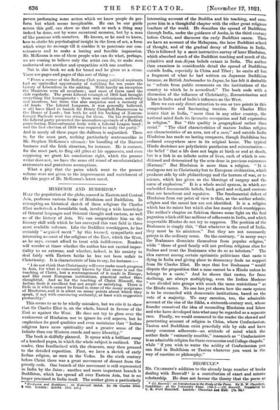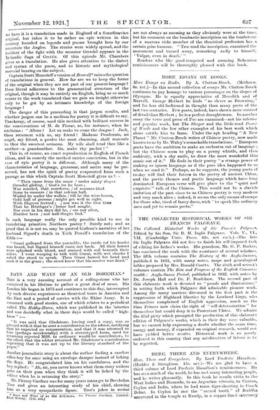BEOWULF.*
Mn. CHAMBERS'S addition to the already large number of books dealing with Beowulf' is a contribution of exact and minute scholarship. He does not favour` the theory that the poem as
• (1) Beoundf : an introduction to the Study of the Poem. By R. W. Chambers. Cambridge: at the University Press. (308.]—(2) Beoundf. Translated by C. K. Scott Moncrieff. London : Chapman and Rail. Us. 64.1
we have it is a translation made in England of a Scandinavian original, but takes it to be rather an epic written in this country founded on legends and poems brought hero by our ancestors the Angles. The stories were widely spread, and the incident of the fight with the monster Grendel appears in the IoAandie Saga of Grettir. Of this episode Mr. Chambers gives us a translation. He also gives attention to the dialect and syntax of the poem, and to historic and mythological material bearing on the subject.
Captain Scott Morterieff's version of Beowulf s raises the question of translations in general. How far are we to keep the forms
of the original when they are not part of our present language ? Does literal adherence to the grammatical structure of the original, though it may be entirely un-English, bring us so much nearer to the work translated that we gain an insight otherwise only to be got by an intimate knowledge of the foreign language ?
The danger of this proceeding is that jargon results, and whether jargon can be a medium for poetry it is difficult to say. Thackeray, of course, used this method with brilliant success in the conversations of M. de Florae, as, for instance, when he exclaims : " Aliens Let us make to come the dmguc ! Jack,
thou returnest with us, my friend ! Madame Pendennis, an angel, my friend, a quakTe the most charming, shall roucoulo
to thee the sweetest sermons. My wife shall tend thee like a mother—a grandmother. Go, make thy packet ! "
This is, of course, an exact reproduction in English of French idiom, and in comedy the method carries conviction, but in the case of epic' poetry it is different. Although many of the characteristics of language, grammar, and metre may be pre- served, has not the spirit of poetry evaporated front such a passage as this which Captain Scott Moncricff gives us ?---
" Then came from the moor 1 under misty slopes Grendel gliding, / God's ire he bare ;
Was minded, that murderer, / of mannes-kind Some to ensnare / in that solemn hall.
Waded he under the welkin / till he tho wine-house, Gold hall of grooms / might get well in sight, With filigrees fretted ; / nor was it the first time That he Hrothgar's / home had sought. Nor over in his days did he, / em nor after, Hardier hero / nor hall-thegns find."
Is such language really the only possible kind to use in translating primitive Northern poetry ? Surely not; and as proof that it is not so, may be quoted Gudrun's narrative of her husband Sigurd's death in York Powell's translation of the Edda :— .
"Grani galloped from the assembly, the rattle (of his hoofs) was heard, but Sigurd himself came not back. All their horses were splashed with blood, and stained with soil beneath their riders. I went weeping to talk with Grani, with wet cheeks I asked the steed to speak. Then Grani bowed his head and sank it in the grass ; the steed knew that his master was dead."







































 Previous page
Previous page